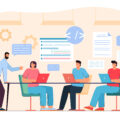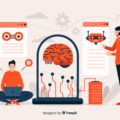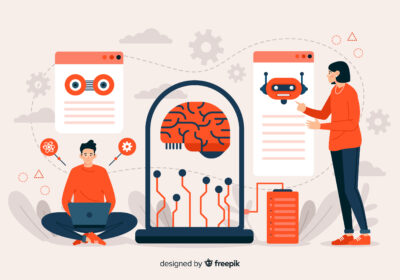The future of work isn’t human or AI. It’s human with AI.
Businesses today are racing to adopt artificial intelligence across customer service, operations, marketing, and even hiring. From intelligent chatbots to generative design tools, AI is quickly becoming the default lever for efficiency and scale.
But here’s the catch: in the rush to automate, many organizations are overlooking something crucial — people.
AI is powerful, yes. But it’s not a silver bullet. Without human judgment, creativity, and empathy, even the most sophisticated AI tools can create more friction than value.
Let’s unpack why balancing AI with human employees isn’t just ethical — it’s smart business.
AI Can Do a Lot, But Not Everything
AI thrives on pattern recognition. It can analyze mountains of data in seconds, identify trends, automate routine tasks, and even learn from feedback loops. It excels in roles where scale, speed, and predictability matter.
But AI lacks:
-
Emotional intelligence
-
Contextual understanding
-
Moral judgment
-
Creativity beyond training data
-
The ability to navigate nuance
Human employees bring these qualities to the table. A great customer service agent knows when to bend a rule to keep a customer loyal. A product designer understands what feels right, not just what the metrics say. A manager can mediate team conflicts in ways no algorithm ever could.
Why Balance Matters
1. Trust Depends on Human Touch
Customers expect speed, but they value empathy. AI might answer a support query instantly, but only a human can truly listen, adapt, and de-escalate frustration.
Combining AI’s efficiency with a human’s empathy creates the kind of service that builds long-term trust.
2. Innovation Needs More Than Data
AI can remix what already exists. Humans imagine what doesn’t. New products, bold campaigns, market pivots — these require leaps of creativity, not just statistical predictions.
AI can assist, but the “spark” still comes from human intuition.
3. Ethical Oversight Is a Human Responsibility
AI systems reflect the data they’re trained on, which means they can unintentionally amplify bias, misinformation, or discrimination. Whether you’re using AI in hiring, lending, or healthcare, someone needs to be accountable.
Ethical governance, fairness, and inclusive decision-making can’t be fully automated — they must be actively stewarded by people.
4. Over-Automation Hurts Morale
When employees feel like they’re being replaced by machines, motivation drops. On the flip side, when AI is framed as a tool to empower them — helping them do more of the meaningful work and less of the repetitive grind — morale and productivity both rise.
AI should be your team’s sidekick, not their substitute.
What Balance Looks Like in Practice
The right balance isn’t a fixed formula — it depends on your industry, culture, and objectives. But here are a few principles to guide it:
-
Automate tasks, not roles: Use AI to streamline repetitive processes so humans can focus on judgment-based work.
-
Human-in-the-loop design: Keep a person involved in key decision points, especially where risk, ethics, or empathy are involved.
-
Reskill, don’t replace: Invest in upskilling your workforce to work alongside AI tools rather than being displaced by them.
-
Measure impact on both sides: Evaluate how AI tools affect customer satisfaction and employee engagement. Balance both.
The Future Is Collaborative, Not Competitive
AI is here to stay. And that’s a good thing. It can make work faster, smarter, and more scalable. But the companies that win in the long run will be the ones who use AI to amplify their people, not replace them.
Because at the heart of every great company — behind every product, every sale, every experience — is a human being making a decision, telling a story, or solving a problem.
And no machine can fully replicate that.
Final Thoughts
AI is not the enemy of jobs. Misused AI is.
The real opportunity lies in redesigning work so that humans do what they do best — think, feel, imagine, connect — while AI handles the heavy lifting. When done right, it’s not just a tech upgrade. It’s a transformation of culture, performance, and purpose.
At Verbat, we help companies implement AI solutions that enhance human performance instead of replacing it. Whether you’re exploring intelligent automation or rethinking workforce strategy, we can help you strike the right balance.
Let’s build a future of work that’s human-centered and AI-empowered.





